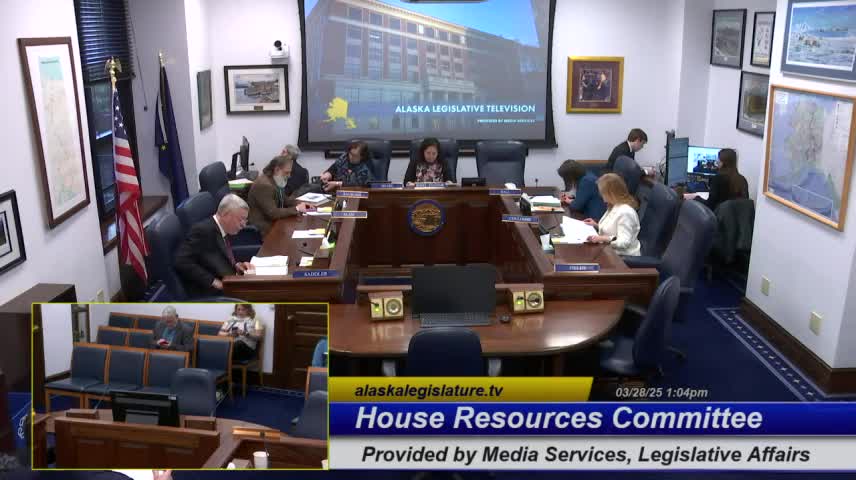House resources committee hears bill to recognize set gillnet co‑operatives; extends amendment deadline
Get AI-powered insights, summaries, and transcripts
Subscribe
Summary
Representative Sarah Stutes returned to the Alaska House Resources Committee on March 28 to present House Bill 117, a bill that would formally allow set gillnet permit holders to operate cooperatively and to have one or several permit holders deliver on behalf of the group.
Representative Sarah Stutes returned to the Alaska House Resources Committee on March 28 to present House Bill 117, a bill that would formally allow set gillnet permit holders to operate cooperatively and to have one or several permit holders deliver on behalf of the group. The committee heard testimony from the bill sponsor, Department of Fish and Game staff, the Department of Law and Department of Public Safety officials.
The bill’s sponsor, Representative Stutes, and her staff described HB 117 as a legislative effort to preserve a longstanding practice in multiple salmon fisheries that allows family and small-group permit holders to combine landings and have a single delivery recorded on a fish ticket. "Set netters across the state support this legislation," said Matt Greening, staff to Representative Stutes, during his refresher remarks to the committee.
Supporters told the committee the practice is common in Kodiak, Bristol Bay and other areas and in some cases is multigenerational. Greening said the measure would require registries and reporting designed to give fisheries managers and troopers clearer information about who is participating in a cooperative operation.
Forrest Bowers, acting director of the Division of Commercial Fisheries at the Alaska Department of Fish and Game, told the committee stakeholders first pursued regulatory changes through the Board of Fisheries via an agenda change request, but the board found the request did not meet its criteria at an October 2024 work session and the ACR failed. Bowers said reporting and fish‑ticket requirements are governed by department regulations promulgated under the commissioner’s authority and supported by statutes; because the statutes already speak to related topics — including transporting fish and definitions of unit of gear — the department recommended a legislative solution rather than changing department regulation alone.
Deputy Attorney General John Skidmore of the Department of Law said the department’s view is that the current interpretation "is not a change in interpretation," and that the department’s reading aligns with precedent going back to a 2005 Alaska Supreme Court decision and with earlier reports about permit stacking.
Representatives questioned whether a legislative change tailored to the set gillnet fishery could have implications in other fisheries. Bowers and Greening said the bill as drafted is aimed at set gillnet operations but acknowledged the transporter registration and other statutory tools exist and could prompt similar requests in other fisheries in the future.
Commissioner James Cockrell and Colonel Brian Barlow of the Alaska Department of Public Safety and Alaska Wildlife Troopers told the committee their enforcement posture has not changed. "The Alaska wildlife troopers have not changed our enforcement posture," Cockrell said, adding that troopers have enforced statutes and regulations consistently and that the department seeks to protect the integrity of the Commercial Fisheries Entry Commission (CFEC) permit system. Colonel Barlow noted the agency’s enforcement and education work is limited by resources and that patrol patterns can change which fisheries get more active enforcement at different times.
Barlow also told the committee that, from Jan. 1, 2022 through late 2024, the wildlife troopers had opened 14 cases across fisheries related to delivery and sale of fish, falsified fish tickets and similar matters.
Committee members and the sponsor discussed guardrails the bill could include to address law‑enforcement concerns about permit stacking and the grain‑of‑the‑fleet effect. Greening said the bill’s authors are open to sidebars and language to prevent permit stacking and that one approach is to give the Board of Fisheries the ability to set the allowable number of permits in a cooperative for each administrative area rather than set a single statewide number in statute.
There was no committee vote on final passage. The committee set HB 117 aside for further work and extended the deadline to file amendments to noon on Friday, April 4. Committee members and agency representatives said they would continue to work on clarifying language and sidebars to address enforcement and permit‑integrity concerns.
What’s next: HB 117 remains pending in the House Resources Committee. Lawmakers extended the amendment deadline to noon April 4; sponsors and staff said they will continue to consult with Department of Public Safety, Department of Law, Department of Fish and Game, the Board of Fisheries stakeholders and the United Fishermen of Alaska on draft amendments.
